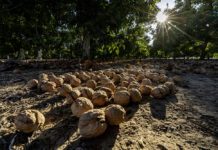As the California Walnut Commission toasts Carol’s retirement, we connected with her to reflect on her passion for research, walnuts and her leadership in tapping health research to advance the industry.
Q How did your partnership with California Walnuts start?
I first came on board to support CWC at a conference for health professionals in 2000. From that small job, I continued as the Nutrition Consultant for California Walnuts for the next seven years or so working with the marketing team and supported researchers. As the health research program grew, I took on more responsibilities, managing research projects and building visibility for the health benefits of walnuts among health professionals and researchers. In 2016, I was given the title of Health Research Director.
Q Tell us about a walnut nutrition research project of which you are most proud?
Like a mom, there is no favorite child, and the same is to be said of all the research projects! However, one project that’s been particularly exciting for me to watch is the male reproductive research with Dr. Wendie Robbins at UCLA. The overall goal of this project was to determine if dietary intake of walnuts would benefit male reproductive health…. and indeed it did! Infertility affects men and women equally, and the fact that health studies have provided encouraging results regarding the role of walnuts in reproductive health is exciting.
Also, our research funding collaborations with the American Heart Association and the USDA-National Institute of Food and Agriculture, Agriculture and Food Research Initiative (AFRI) Program have been wonderful. To have third-party organizations want to co-fund new research is a testament to the vision of our members and staff.
Q Over the years, have there been any research projects or results that have surprised you?
A highlight of my time with CWC was working with Dr. Elaine Hardman, who conducted animal model studies and found that mice consuming walnuts had a reduced risk of breast cancer. California Walnuts supported a pilot study she conducted with women who had breast lumps large enough for research and pathology biopsies. Some of these women consumed 2 ounces of walnuts daily for about two weeks. It was found that these subjects had beneficial changes in gene expression, which could suppress growth and survival of breast cancers. It’s remarkable research showing the simple task of consuming walnuts as part of a healthy diet may have such a large impact.
Q What research on walnuts has been most pivotal for advancing nutrition science?
As a registered dietitian for more than 40 years, I have seen significant changes in dietary fat recommendations. When I started my career as an R.D., we were taught to counsel avoidance of all fatty foods and promote consumption of simple carbohydrates. This was based on the research available at the time. Research by Joan Sabaté, M.D., D.Ph., Emilio Ros, M.D., Penny Kris-Etherton, Ph.D., RDN, David Jacobs, Ph.D., David Baer, Ph.D., Linda Tapsell, Ph.D., and so many others changed the way health professionals and consumers looked at and differentiated the types of fat (saturated, monounsaturated, polyunsaturated.) The walnut industry was visionary in supporting dietary fat research as related to walnuts, which are a significant source of plant-based omega-3 ALA (alpha-linolenic acid, 2.5 g/oz).
Q What would you like to share about the future of walnuts as it relates to nutrition?
California Walnuts have a unique nutrient composition, which lends so well to health research. I’m deeply proud of our industry for its commitment to research and the studies conducted to date, especially since research on whole foods is uncommon. Our industry was ahead of the curve when strategically planning support of nutrition and health research, and we have gladly marketed all of the health benefits our research has established. But we’ve just scratched the surface; there is much more to learn about walnut consumption and health!
















